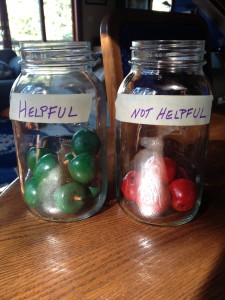Imagine two empty glass jars. One labeled Helpful. One labeled Not Helpful. Imagine each time you say something to someone (online or off) you must put a marble in one jar or the other. By the end of the day which jar has more marbles?
Getting along with each other has always been a major challenge on this planet. Each day, each of us has the power to increase hostilities or increase feelings of friendship and cooperation at home, at school. Everywhere. It’s really that simple.
Think about the two jars with this hypothetical situation:
A group of kids sit at a lunch table with one empty seat. A new kid comes over carrying a lunch tray and asks “Can I sit here?” For each choice, which jar gets a marble, Helpful or Not Helpful?
Someone says “No way!” H or N
New Kid throws a french fry at someone. H or N
Someone lies and says, “Sorry, but I’m saving this seat for my friend.” H or N
New Kid lies and says, “No problem.” H or N
New Kid says, “I don’t want to sit with you. You’re mean.” H or N
Someone says “Sure” and makes room. H or N
Someone frowns but doesn’t move. H or N
Someone quickly puts her sweater on the empty seat. H or N
Someone says, “No weirdos at this table.” H or N
Someone laughs. H or N
Someone feels bad, but says nothing. H or N
Someone says, “Don’t be mean. Let her sit with us.” H or N
Someone whispers, “Why can’t she sit here?” H or N
Someone shrugs and says nothing. H or N
Someone pretends to text. H or N
Someone from another table and invites New Girl to sit with them. H or N
Now count your marbles. How many in each jar? What would you personally do in this situation? Not sure? That’s honest. Think about it some more. I understand this isn’t an easy question. Talk to your children. Your partner. Encourage your kids to talk to their friends. Share the idea of the two jars with them. We all agree that everyone wants to be treated with kindness and respect. That’s so clear. But when it comes to how we treat others, moment to moment, not so clear. Which jar are filling up today?
NOTE: I’m leading a series of Girls’ Friendship Without the Drama Workshops for the Girl Scouts and anyone else who wants to get a group of 15+ together to learn to be more helpful.













